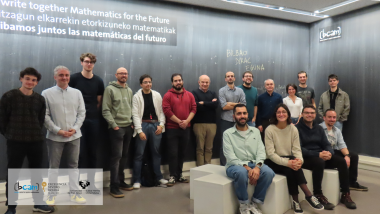Lander Rodriguez defenderá su tesis el jueves, 9 de octubre
La defensa tendrá lugar en el Campus de Leioa de la UPV/EHU, a las 10:30 horas.
Lander Rodríguez es investigador en matemáticas aplicadas, con un enfoque en las ciencias de la salud, aunque mantiene también un gran interés por el ámbito deportivo y otras áreas. Es graduado en Ingeniería Industrial y posee un Máster en Ingeniería Industrial, ambos obtenidos en la Escuela de Ingeniería de Bilbao. Tras varios años de trabajo en un centro de investigación dedicado a la máquina-herramienta, descubrió que su verdadera pasión residía en las matemáticas —especialmente en la estadística y el machine learning— y en sus aplicaciones prácticas. Esto le llevó a comenzar su doctorado a finales de 2021 en BCAM, en colaboración con la Universidad del País Vasco (UPV/EHU).
Su tesis, titulada “Análisis de la pandemia de la COVID-19 en el País Vasco y caracterización de los perfiles de infección”, está dirigida por la Prof. Irantzu Barrio (EHU & BCAM) y el Dr. José María Quintana López (Instituto Biosistemak de Investigación en Sistemas de Salud). La defensa está programada para el 9 de octubre de 2025, a las 10:30 horas, en el Campus de Leioa de la UPV/EHU.
En nombre de todas las personas de BCAM, queremos desearle todo lo mejor para el futuro, tanto en el ámbito profesional como en el personal.
Abstract
This thesis presents a comprehensive analysis of the COVID-19 pandemic in the Basque Country, using advanced statistical methods to capture its complexity and extract lessons for future health crises. Based on a database that included all SARS-CoV-2 adult infections that occurred in the Basque Country from March 1, 2020 until January 9, 2022, the research applied Bayesian spatio-temporal modeling to examine the geographical and temporal variation of infections, hospitalizations, deaths, and reinfections and the factors influencing them. Results revealed socioeconomically disadvantaged regions faced higher risks of severe outcomes, while rural areas may have faced barriers to hospital access.
In parallel, clinical phenotyping was performed through clustering techniques based on basic patient data, identifying meaningful patient profiles within the general COVID-19 population, among emergency department patients, and among reinfected individuals. These phenotypes, developed in an unsupervised manner, were associated with the clinical outcomes of the disease, suggesting the potential prognosis of patients can be anticipated through a simple classification system. This could be really valuable during new pandemics, as the most vulnerable groups could be rapidly identified, even before outcomes were available. In addition, the phenotypes proved stable across different pandemic phases, suggesting an initial segregation of the phenotypes is still valid at different stages of the pandemic. Reinfection analyses uncovered behavioral and demographic differences that influenced both the timing and severity of secondary infections.
Altogether, this thesis provided an in-depth analysis of the COVID-19 pandemic in the Basque Country. While the approaches presented were tested locally, they have the potential to be used in other regions and other pandemics, enhancing our preparation for potential future threats.
Related news
La gente del BCAM




